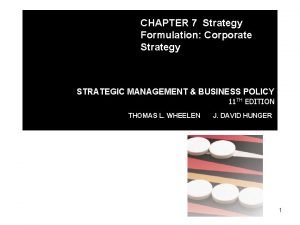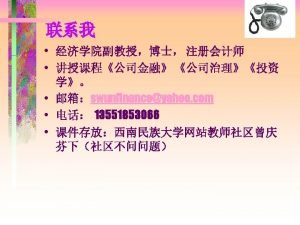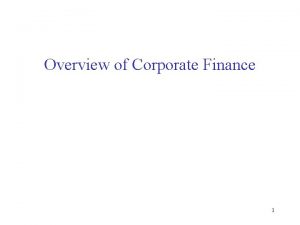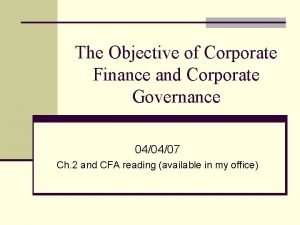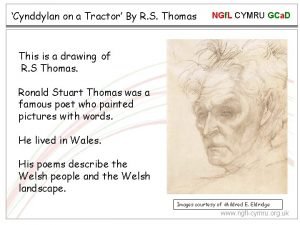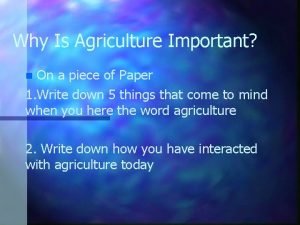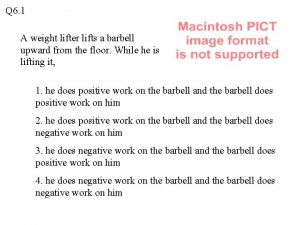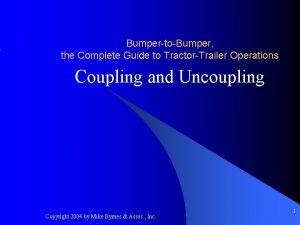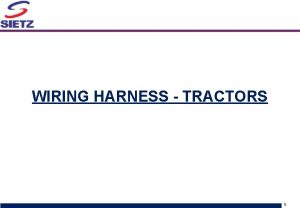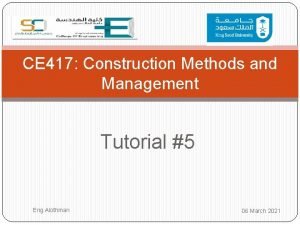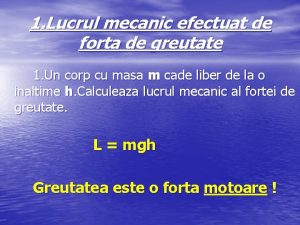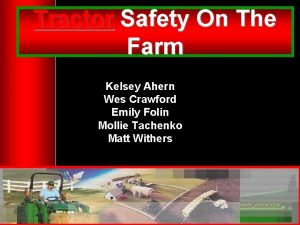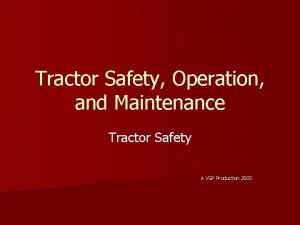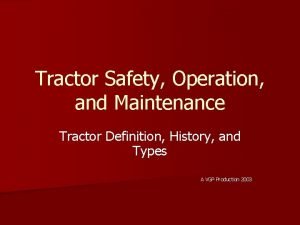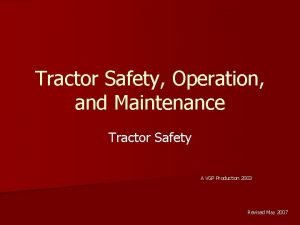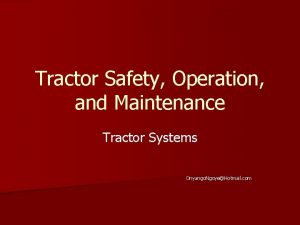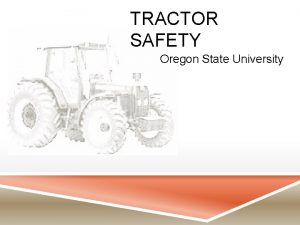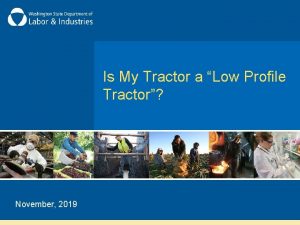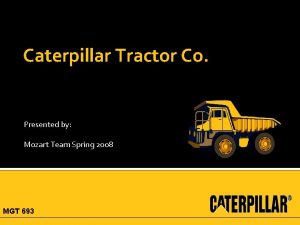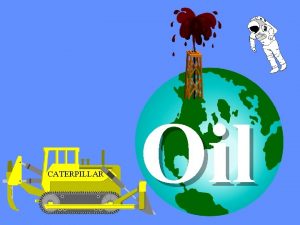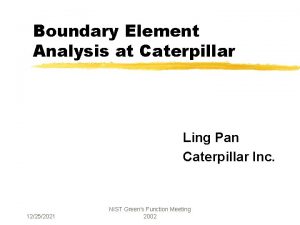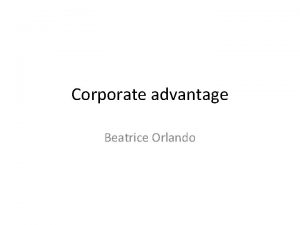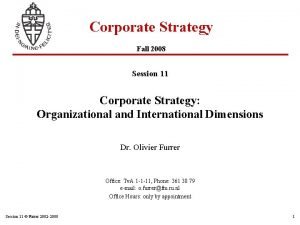CATERPILLAR TRACTOR CO An Overview of Corporate Strategy

















- Slides: 17


CATERPILLAR TRACTOR CO. An Overview of Corporate Strategy and Performance Team Belinda Spring 2008

AGENDA Background Environment Corporate Strategy Business Strategy Strategic Management Financial Performance Success Factors Challenges And Solutions Current Problems Recommendations Update

INDUSTRY BACKGROUND WWI and WWII created a high demand for EME (Earth-Moving Equipment) The demand for EME rose after the wars for interstate highway construction, but waned after their completion The demand for EMEs grew in underdeveloped countries as they began to industrialize In the 1970’s, EMEs were a crucial part of the booming coal and oil industries both

CATERPILLAR TRACTOR CO. BACKGROUND Caterpillar Tractor Co. (CAT) was formed from the merger of Holt Manufacturing Co. and C. L. Best Tractor Co. in 1925 Began designing, manufacturing, and marketing: Earth-moving construction and material handling machinery and equipment and related parts Engines for EME Expansion of product line in 1940 Grew to become the worlds largest manufacturer of EME

COMPETITORS J. I. Case (A Division of Tenneco) John Deere Clark Equipment Fiat-Allis International Harvester

CORPORATE STRATEGY Highly Vertically Integrated Low-Level of Diversification Over 90% of revenue comes from parts, service, and sales of EME Expansion Development Strategy Nearly 90% of parts and components are manufactured inhouse Closely tied to all of the dealerships 6 -7% Growth per year Joint ventured with overseas companies to take advantage of tax benefits and international regulations (government funding)

BUSINESS STRATEGY Quality-Based (Upward) Focused Differentiation Customer Service Excellence Strong relationship with EME owners Many dealerships for repairs Offered repairs instead of replacements Product Quality Improvements focused on existing products Premium Cost for Premium Products 10 -20% Higher sales price than nearest competitor

STRATEGIC MANAGEMENT Resource Based Model for Internal Strategy Hire employees on a long-term basis only Conduct in-house management training Sacrificed profit margins to prevent a loss of customers due to poor quality or service Focused on globalization and expansion

SUCCESS FACTORS War-Time Opportunities The Allied Forces used parts for tanks and machinery US Army decided to standardize on CAT’s EME Post-War Opportunities Established independent dealerships to service machines left in Asia and Europe Reconstruction of war-torn countries created a high demand for EME

FINANCIAL PERFORMANCE CAT has maintained over 50% of its industry’s market share since the 1970’s Leading up to and through WWII (1941 -44) sales tripled In 1980, Sales reached a high of $8. 6 Billion and projected even higher for 1981 57% of sales came from overseas

COMPETITIVE ADVANTAGE Having local plants gave a competitive advantage by lower distribution costs Leveraged technological advancements to provide innovative products, services, and solutions More international recognition than competitors Highly dedicated employees and management “Severally Responsible” Teamwork Corporate Culture of Dedication

CHALLENGES AND SOLUTIONS Decline in business after the completion of interstate highways Labor strike of 40, 000 workers in 1979 CAT shifted its focus for the coal and oil industries both domestically and abroad CAT focused on developing countries CAT laid off 5, 600 laborers and contended that the remaining employees are paid an average of over 80% more than Komatsu Overseas constructions were contracted out to local companies CAT entered into joint ventures to compete more internationally

CURRENT PROBLEMS (AS OF CASE) Japanese steel costs 30% less than US made steel, giving manufacturers like Komatsu a manufacturing advantage CAT’s US based labor is a larger percentage of manufacturing costs than its foreign competitors Economic factors have caused a decline in US construction activity

RECOMMENDATIONS Increase International Business Establish and expand partnerships with overseas suppliers to gain an advantage in materials Take advantage of low-cost foreign inputs, such as materials and labor Continue to expand EME sales and service to developing countries Expand Into Other Industries Analyze other possible uses for EME technology Continue Long-term Planning and Current Management Strategies

UPDATE CAT continues to be the world’s leading manufacturing company of construction equipment, diesel and natural gas engines, and industrial gas turbines. CAT is also a leading service provider through its financial, remanufacturing, logistics, and progress rail services Today CAT has nearly 300 operations in 40 countries on every continent

QUESTIONS?
 Caterpillar tractor co
Caterpillar tractor co Directional strategies in strategic management
Directional strategies in strategic management Business strategy vs corporate strategy
Business strategy vs corporate strategy Corporate finance overview
Corporate finance overview Examples of agency problems
Examples of agency problems Objective of corporate governance
Objective of corporate governance Johnny tractor y su pandilla
Johnny tractor y su pandilla Cynddylan on a tractor
Cynddylan on a tractor A local tractor dealership is best described as an
A local tractor dealership is best described as an A tractor driving at a constant speed
A tractor driving at a constant speed What is step 16 when coupling a tractor to a trailer
What is step 16 when coupling a tractor to a trailer Automatisch sturen met gps
Automatisch sturen met gps Tractor definition
Tractor definition Tractor wiring harness manufacturers
Tractor wiring harness manufacturers Coefficient of traction for crawler tractor
Coefficient of traction for crawler tractor Lucru mecanic al fortei de frecare
Lucru mecanic al fortei de frecare Tractor safety course oregon
Tractor safety course oregon Ahern tractor
Ahern tractor

